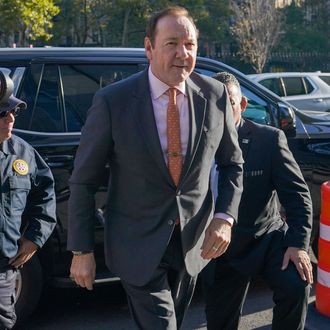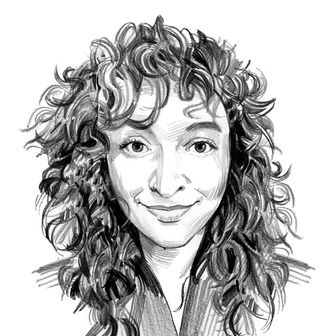
Kevin Spacey’s testimony at his sex-abuse civil trial in New York on October 17 had all the elements of a melodramatic production. Moments after taking the stand, he claimed his father had been a failed writer, a neo-Nazi, and a homophobe as the actor detailed an upbringing that could best be described as emotionally Dickensian. Several hours later, Spacey teared up when detailing the fallout from Anthony Rapp’s misconduct allegations against him and cried about his own botched coming out in the wake of the accusations. In 2017, Rapp accused Spacey of sexual misconduct for having made an unwanted, aggressive sexual advance toward him after a house party in 1986. At the time, Rapp was 14 years old and Spacey was 26. Rapp sued Spacey in 2020 over the alleged incident.
“I grew up in a very complicated family dynamic,” Spacey said at the beginning of his testimony. “My father was unemployed a great deal at the time, so therefore he was home a lot of the time.” The family moved frequently, and his father “fell into” disturbing ideas and associates. “My father was a white supremacist and a neo-Nazi,” Spacey said. “It meant that my siblings and I had to listen to my father lecturing us for hours and hours and hours about his beliefs and his ideas.” But, Spacey continued, that was when his own “hatred of bigotry and intolerance began.” He discussed this family dynamic as his lawyer tried to establish why Spacey hadn’t come out until 2017 after Rapp’s allegations came to light. Spacey’s lawyers have contended that Rapp blamed his flagging career on the fact that he was an out actor. The younger man, they have maintained, was annoyed that Spacey was not publicly open with his sexuality and, accordingly, did not experience the same career ramifications.
Spacey told jurors that the shame surrounding his household made him a private person overall — and not just about his sexual orientation. “My best friend in high school, who [is] Jewish, who is still a great friend to this day — I couldn’t bring him to my house,” Spacey said. “Everything about what was happening in that house was something I felt I had to keep to myself and keep private and never, ever talk about to anybody.” He said that he has “never talked about these things publicly” and that he grew up in a situation in which he “wasn’t comfortable talking about things. And part of those things was my father also used to yell at me about the idea that I might be gay because I was interested in theater, and he didn’t encourage me in that way. My father would scream at me, ‘Don’t be a —.’ he would use an F-word that is very derogatory to the gay community; I won’t say it in court. As I continued in my life, I think I just, I had a degree of shame because I wanted people to remember the characters that I played and not know too much about me.” Before relating these details of his childhood, Spacey said Rapp’s allegation of an aggressive, unwanted sexual overture was “not true.”
Spacey’s testimony turned exceedingly theatrical after the lunch break. His attorney, Chase Scolnick, asked him to explain a floor plan of his former studio apartment, where Rapp alleged the incident had taken place. The diagram, which was displayed on a piece of foam poster board, was placed on an easel-like stand in the middle of Judge Lewis Kaplan’s courtroom. Spacey left the witness box and stood in front of the graphic. Kaplan’s courtroom deputy handed Spacey a microphone, and Scolnick then asked Spacey to explain the layout: Could he draw where the bed was? The sofa? Spacey, who wore a pale-gray suit, white shirt, and pink tie, carried himself with an affable composure, performing these tasks directly in front of jurors and speaking into the mic. Not long after returning to the witness stand, he did an impersonation of Jack Lemmon; they had performed together in the spring 1986 Broadway production of Long Day’s Journey Into Night. But Spacey’s demeanor changed when he recalled learning about Rapp’s allegations. He claimed he and his representatives had worked tirelessly to figure out a response. They had told him he couldn’t just deny the allegations or he would be victim-shaming. At around this time, he started crying in the courtroom.
“They told me I couldn’t push back,” Spacey said, touching his face, sniffling, and dabbing at his eye with a tissue. He said he ultimately went along with his publicists’ strategy of saying he would have owed Rapp an apology if the incident had indeed happened. He also came out as a gay man in this apology statement. Spacey said he regrets apologizing for something he didn’t do — and for coming out at that exact moment. “I was accused by the gay community of trying to change the subject,” he said, choking up and sniffling again. “It was never my intention, and I never would have done anything to hurt the gay community.” An increasingly weepy Spacey added, “No matter how many people were helping me on this day and giving me advice, that’s mine. I have to own that. It was really wrong, and it was really bad, and I am deeply sorry.”
During Rapp’s testimony earlier this month, he described his fear when Spacey allegedly picked him up and climbed on top of him. “I was frozen. I was pinned underneath him,” Rapp said. “I didn’t really know what to do.” Rapp said he had “felt like a deer in headlights.” He claimed to suffer an ongoing emotional toll. The first time Rapp saw Spacey after the purported incident, when he went to see Working Girl not realizing Spacey was in it, was a shock, he said. “It was as if someone had poked me with a cattle prod,” Rapp remembered. He continued to see Spacey’s films out of a sense of “duty” as an actor. The last he saw was American Beauty. “He was playing a character where he was sexually involved with a teenager,” Rapp said. “It felt unpleasantly familiar.” Spacey’s team has repeatedly contended that Rapp was motivated by spite over the now-fallen star’s continued success.
This is a developing story.


